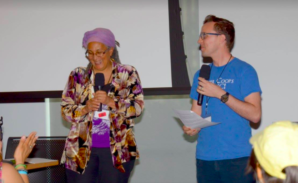 From June 9-11, cooperators from around the country gathered at Fordham University Lincoln Center to attend the Eastern Conference for Workplace Democracy (ECWD). The ECWD is a non-profit cooperative organization. It is managed by a coordination council elected by the ECWD general membership, and they work in close partnership with the United States Federation of Worker Cooperatives. The conference, held every year in the Eastern United States, exposes people to the concept of worker-ownership, and develops relationships between cooperatives, labor institutions, and resource organizations.
From June 9-11, cooperators from around the country gathered at Fordham University Lincoln Center to attend the Eastern Conference for Workplace Democracy (ECWD). The ECWD is a non-profit cooperative organization. It is managed by a coordination council elected by the ECWD general membership, and they work in close partnership with the United States Federation of Worker Cooperatives. The conference, held every year in the Eastern United States, exposes people to the concept of worker-ownership, and develops relationships between cooperatives, labor institutions, and resource organizations.
This year’s conference featured a variety of workshops, starting off with a day of pre-conference sessions which included a day-long workshop on “Advancing the Development of Worker Cooperatives,” facilitated by Jessica Gordon Nembhard. Participants discussed not only the practical aspects of building and sustaining a worker-owned business, but also the political and theoretical framework and future of the cooperative movement. Other Friday sessions included a legal intensive as well as a bookkeeping intensive.
Saturday and Sunday were filled with different workshops, including some shining a spotlight on important aspects of the solidarity economy movement that get less visibility. Rachel Isreeli (Center for Family Life), Leigh Brown (Democracy at Work Institute), Patri Gonzalez Ramirez and Pao Lebron (Caracol Interpreters) facilitated a strategy session on queer and trans economic democracy and self determination, a discussion too often left out of conference spaces around economic democracy. At the same time, Esteban Kelly (AORTA and USFW) facilitated a workshop on worker cooperatives in a vision for Black lives, and AORTA facilitators Autumn Brown, Jenna Peters-Golden, and Manju Rajendran led a workshop on addressing anti-Black racism in our cooperatives. Of course, these are not the only social justice conversations that are happening and need to be happening in the movement towards economic democracy and a thriving solidarity economy. However, we are extremely grateful for the folks who are putting hours into developing, implementing, and following up on these workshops.
Thank you to everybody who helped put this workshop together, from the food to the scholarships to the interpretation (provided by Caracol Interpreters, who continue to make space for language justice at so many of our events)!
*Fore more photos, click here!

